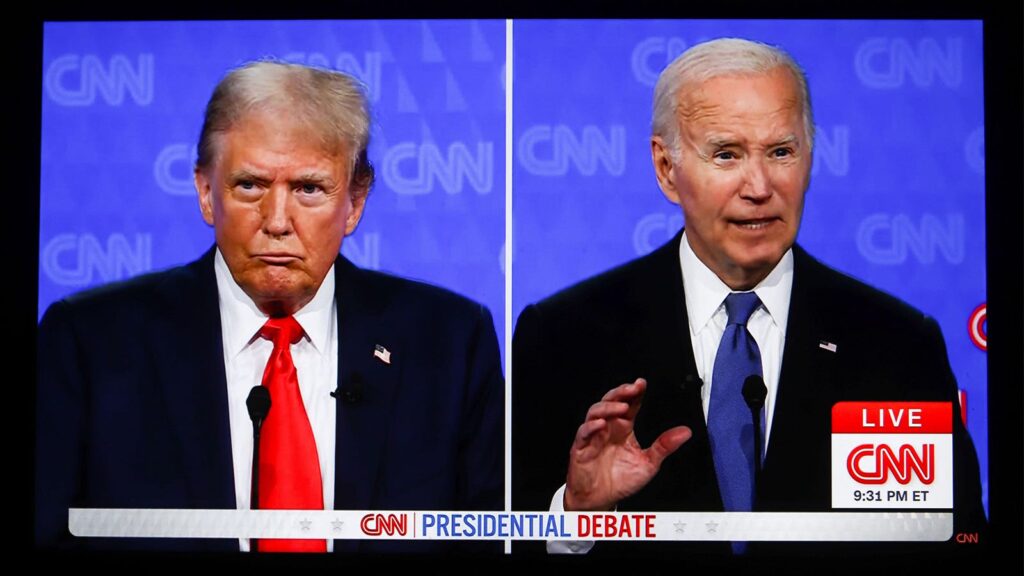Sonnenfeld is a professor of leadership practice. Krumholz is a cardiologist and a professor of medicine.
Early last week, Donald Trump suggested that Joe Biden would be on performance-enhancing drugs for the presidential debate and demanded a drug test. The claim was widely laughed off as Trumpaganda, creating another fact-free conspiratorial haze. Still, perhaps Trump was onto something. The country is struggling to reconcile Biden’s cognitive impairment during the debate with his obvious recovery well into the night and the next day.
The most probable explanation for this transient period of cognitive impairment in an older person with a cold is a side effect of cold medications. If this is so, the hand-wringing should cease, and we should use the debate as a reminder of how common such reactions are rather than an indication that the president is chronically debilitated.
In recent weeks, Biden has made several high-profile public appearances on the world stage. He commemorated the 80th anniversary of D-Day in Normandy, France, attended press briefings at the G7 Summit in Italy, and engaged with the public and world leaders. Journalists who have been beside Biden closely these past few weeks reported no such impairment, aligning with bullish sentiment from the Biden debate prep team. Everyone would have noticed if Biden exhibited even a fraction of what he displayed at the debate.
During the debate, particularly in the first half, Biden trailed off into odd digressions unrelated to the moderators’ questions, often mumbling almost inaudibly. This performance was not just worse than the trivial gaffes we’ve come to expect from Biden; it appeared to indicate a clinical problem.
For instance, he commented, “…we finally beat Medicare,” when responding to a question about inflation.
Trump replied, “I don’t even know what he just said in that last sentence, and I don’t think he does either.”
In response to a question about abortion, Biden hesitatingly offered jumbled canned lines about immigration while staring dazed, mouth agape during breaks. This is not the president we have seen in the last 3 years or even the last few weeks.
As time passed, the fog lifted. He improved throughout the debate and later in the evening, engaging with people far into the night. The next day, he delivered a fiery speech in North Carolina without missing a beat. The short half-life of many of these drugs could explain Biden’s resilient post-debate appearances.
Biden’s symptoms appeared consistent with someone suffering from temporary drug-induced cognitive impairment. We now know he had a bad cold during the debate. Most people believe common over-the-counter cold medications such as DayQuil, Tylenol, or Advil to be harmless. While generally well tolerated, these medications have well-documented side effects and can cause reduced alertness, diminished attention, poor memory, and reduced reaction time, especially in older individuals. These impairments are transitory but can appear consequential and alarming. Every experienced clinician has seen this effect thousands of times. If anti-cold medications were combined with other drugs, the risks could increase even more.
Upon hearing our perspective, Yale professor of psychiatry Marshal Mandelkern, MD, PhD, concurred: “As a clinician, when someone presents with ‘altered mental status’ I would always think of the possibility of drug ingestion as a cause. This is not only common, it is usually the most benign explanation for a change in mental state.”
Pundits were quick to pile on Biden’s poor performance with amateur diagnoses of permanently diminished mental capacity. Yet, calls for Biden to step down would be premature if the performance resulted from an adverse drug effect. The remedy is to ensure the president avoids these drugs and uses the experience as a teachable moment for seniors nationwide. Age may be an issue, but perhaps it is solely about susceptibility to drug effects.
As great as the coffee at Waffle House — where Biden stopped post-debate — is, we believe the more likely reason for his continued improvement was that the cold medications he may have taken started wearing off. Trump misleads the American public in many areas, but one area where he may have inadvertently been correct was the role drugs played in Biden’s debate performance.
We need to know if President Biden took cold medications before the debate. His doctors should assess the role they may have played. How the American people assess the debate hinges on the answer. It would be tragic to magnify the meaning of an ill-timed adverse drug effect — and potentially have it change the course of history.
Jeffrey Sonnenfeld, DBA, MBA, of the Yale School of Management is the Lester Crown Professor of Leadership Practice and president of the Yale Chief Executive Leadership Institute. Harlan Krumholz, MD, SM, of the Yale School of Medicine is the Harold H. Hines Jr. Professor of Medicine, a cardiologist, and the director of the Yale New Haven Hospital Center for Outcomes Research and Evaluation. He is also a member of the MedPage Today editorial board, and the editor-in-chief of the Journal of the American College of Cardiology.
This piece originally appeared in Newsweek.
Please enable JavaScript to view the

